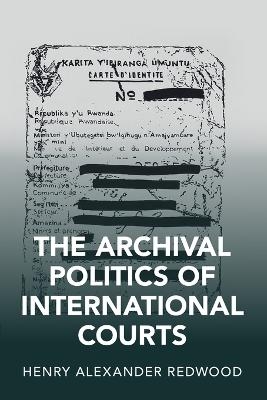
The Archival Politics of International Courts
Seiten
2023
Cambridge University Press (Verlag)
978-1-108-94883-8 (ISBN)
Cambridge University Press (Verlag)
978-1-108-94883-8 (ISBN)
As the first analysis of the archives of international courts, examining how these archives produce particular understandings of what the 'international community' is, the book is essential reading for IR and ILAW scholars and archival scientists, as well as historians interested in the relationship between history, memory and law.
The archives produced by international courts have received little empirical, theoretical or methodological attention within international criminal justice (ICJ) or international relations (IR) studies. Yet, as this book argues, these archives both contain a significant record of past violence, and also help to constitute the international community as a particular reality. As such, this book first offers an interdisciplinary reading of archives, integrating new insights from IR, archival science and post-colonial anthropology to establish the link between archives and community formation. It then focuses on the International Criminal Tribunal for Rwanda's archive, to offer a critical reading of how knowledge is produced in international courts, provides an account of the type of international community that is imagined within these archives, and establishes the importance of the materiality of archives for understanding how knowledge is produced and contested within the international domain.
The archives produced by international courts have received little empirical, theoretical or methodological attention within international criminal justice (ICJ) or international relations (IR) studies. Yet, as this book argues, these archives both contain a significant record of past violence, and also help to constitute the international community as a particular reality. As such, this book first offers an interdisciplinary reading of archives, integrating new insights from IR, archival science and post-colonial anthropology to establish the link between archives and community formation. It then focuses on the International Criminal Tribunal for Rwanda's archive, to offer a critical reading of how knowledge is produced in international courts, provides an account of the type of international community that is imagined within these archives, and establishes the importance of the materiality of archives for understanding how knowledge is produced and contested within the international domain.
Henry Redwood is Lecturer in International Relations at London South Bank University. He is co-editor of Reconciliation (2021), co-author of Impact and International Affairs (2021), and has published withs Review of International Studies (2019), Millennium (2020) and Critical Studies on Security (2021).
1. The politics of archival knowledge in international courts; 2. The international criminal tribunal for Rwanda and its archive; 3: The force of law; 4. Contesting the archive; 5. Reconstituting justice; 6. Imagining community; 7. The residual mechanism and the archive.
| Erscheinungsdatum | 07.11.2023 |
|---|---|
| Reihe/Serie | Cambridge Studies in Law and Society |
| Zusatzinfo | Worked examples or Exercises |
| Verlagsort | Cambridge |
| Sprache | englisch |
| Themenwelt | Recht / Steuern ► EU / Internationales Recht |
| Sozialwissenschaften ► Politik / Verwaltung ► Europäische / Internationale Politik | |
| ISBN-10 | 1-108-94883-9 / 1108948839 |
| ISBN-13 | 978-1-108-94883-8 / 9781108948838 |
| Zustand | Neuware |
| Haben Sie eine Frage zum Produkt? |
Mehr entdecken
aus dem Bereich
aus dem Bereich
Studienbuch
Buch | Hardcover (2023)
De Gruyter Oldenbourg (Verlag)
44,95 €
erfolgreiche Interessenvertretung durch Prozesskompetenz im komplexen …
Buch | Hardcover (2023)
Wiley-VCH (Verlag)
42,00 €


